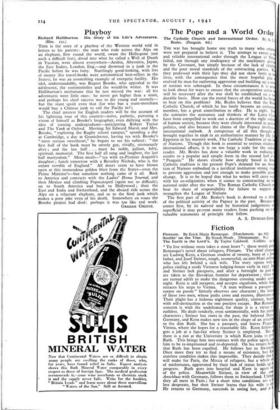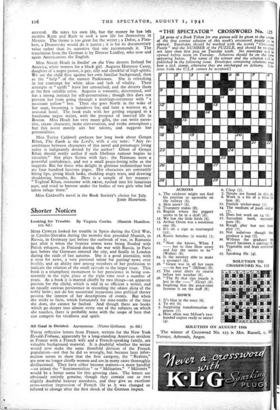Fiction
" To live without roots takes a stout heart ": these words p Remarque's novel about refugees, Flotsam. The chief chara are Ludwig Kern, a German student of twenty, born of a J father, and Josef Steiner, tough, resourceful, an anti-Nazi poll who has left behind a sick wife. The story opens with police raiding a seedy Viennese lodging-house early in 1937. and Steiner lack passports, and after a fortnight in gaol are taken to the Slovakian frontier for deportation ; there are turned adrift to make the dangerous crossing under cove night. Kern is still inexpert, and accepts expulsion, while S retraces his steps to Vienna. " A man without a passport corpse on parole " bitterly observes one character • the his of these two men, whose paths cross and recross, illustrates Their plight has a hideous nightmare quality, sinister, hope with self-destruction as the one positive escape. But Remar concern is with the undefeated, for them it is a virtue to ruthless. He deals tenderly, even sentimentally, with his prill characters ; Steiner has roots in the past, the beloved Marx Germany, and Kern-makes new ties in the shape of an auto to the dim Ruth. She has a passport, and leaves Prague Vienna, where she hopes for a reasonable life. Kern follows gets a job at a fun-fair where Steiner is employed. But there is a riot at the University in which Kern joins to p Ruth. This brings him into contact with the police again, CO him to be re-imprisoned and re-deported. On his return he that Ruth has been expelled. He follows her to Switze Once more they try to find a means of existence, but l( stateless condition makes this impossible. They decide that will make for Paris, the Mecca of refugees, but a whole of misfortunes, aggravated by their lack of status holds up progress. Ruth goes into hospital and Kern is again of the police. Meanwhile Steiner, in view of the Anschluss with Germany, follows them to Switzerland. Cl they all meet in Paris ; for a short time conditions are a less desperate, but then Steiner learns that his wife is He returns to Germany, succeeds in seeing her, and i5
arrested. He takes his own life, but the money he has left enables Kern and Ruth to seek a new life for themselves in Mexico. The theme is too great for the writer ; a Defoe, a Flau- bert, a Dostoevsky would do it justice ; it is for its documentary value rather than its narrative that one recommends it. The translation from the German is by Denver Lindley, who now and again Americanises the English.
Miss Norah Hoult in Smilin' on the Vine deserts Ireland for America, white women for a black girl. Augusta Hortense Casey, daughter of a negro pastor, is gay, silly and chockful -Of high spirits. We see the child first against her own familiar background, then as the " help " of the earnest Parkinsons. She is refreshing in her contempt for white ideas and lack of vitality. Their attempts at " uplift " leave her untouched, and she deserts them at the first suitable crisis. Augusta is romantic, determined, and has a strong instinct for self-preservation ; though this does not prevent her from going through a marriage-ceremony with " a no-count yellow " boy. Then she goes North in the wake of her aunt, becoming a laundress for, and later a waitress at, a seasonal hotel. The book ends with her getting engaged to a handsome negro waiter, with the prospect of married life in Boston. Miss Hoult has very many gifts, she can write narra- tive, create character, make conversation,. and evoke atmosphere ; but this novel merely airs her talents, and suggests her potentialities.
Miss Taylor Caldwell prefaces her long book about Gengis Khan, The Earth is the Lord's, with a coy note : " Any re- semblance between characters of this novel and personages living today is indignantly denied by the author! Ghost of Gengis Khan should notify author if such libellous rumour begins to circulate." She plays fiction with fact: the Naimans were a powerful confederacy, and not a small peace-loving tribe as she suggests. But for those who delight in glorious technicolour here are four hundred luscious pages. Her characters are constantly biting lips, giving black looks, shedding angry tears, and drawing shuddering breaths, &c. Here is a sample of her manner: " Toghrul Khan, overcome with terror, rushed into his luxurious yurt, and tried to burrow under the bodies of two girls who had taken refuge there."
Miss CaldwelPs novel is the Book Society's choice for July.
JOHN HAMPSON.



























 Previous page
Previous page